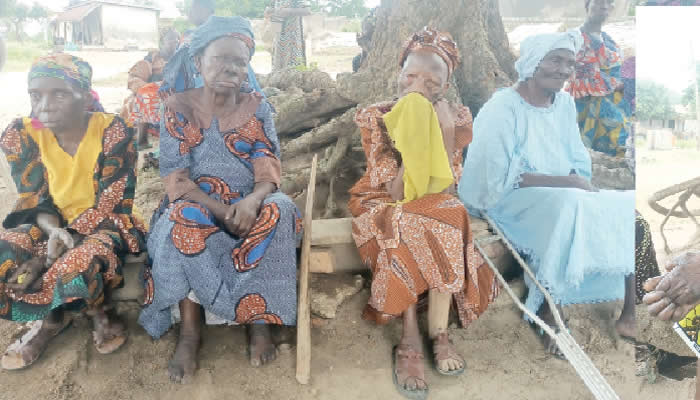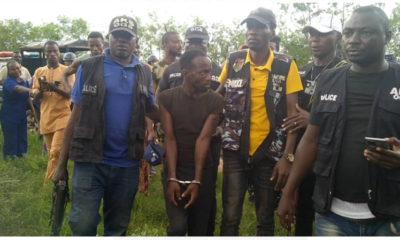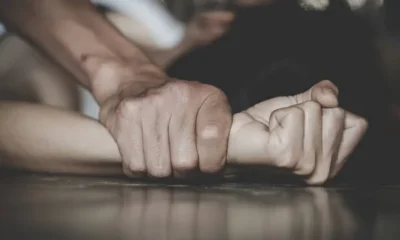News
The starving leprosy community in Ogun cries for help as robbers plundered houses

The inhabitants of the lepers’ colony at Iberoko, Abeokuta, Ogun State, are isolated from the outside world and fight to survive while dealing with the crippling consequences of their disease. Their monthly compensation from the government is a pitiful N10,000, which leaves them with little assistance to deal with both the mental and physical consequences of their condition. OLUFEMI ADEDIRAN lights their struggle for survival on a daily basis and their fortitude in the face of hardship.
The 28 people who live in the Iberekodo Lepers’ Colony in Abeokuta, Ogun State, fight poverty, shame, and neglect on a daily basis.
Not only have these people—many of them are old and weak—been physically destroyed by leprosy, but they have also been socially marginalized by a community that frequently avoids them.
Many difficulties plague them on a daily basis, including lack of access to healthcare, land encroachment, and insecurity.
Isolated from their families and the broader community due to the enduring stigma of their disease, they face adversity at every turn.
While their bodies bear the scars of leprosy, the dire living conditions they endure—crumbling buildings, a lack of basic amenities, and frequent invasions by dangerous criminals—speak even louder to the depth of their suffering.
The colony, once a sanctuary, has become a reflection of their ongoing struggle for dignity and survival.
Scattered throughout the colony are crumbling shelters with roofs torn off, leaving the residents exposed to danger.
“Surviving here has been very hard; life is tough and we are almost helpless”, laments Sunday Olaitan, who has lived in the colony for 19 years.
Life took a difficult turn for 38-year-old Olaitan when his parents discovered that he had leprosy when he was a teenager.
The father of two, who hails from the Oja-Odan community, in the Yewa North Local Government Area of the state, said he lost everything, adding that his life almost became meaningless and worthless until he was brought into the colony in 2005.
“I was 19 when they discovered that I have leprosy. Initially, nobody knew what the disease was until a nurse in our community suggested that my parents take me to Abeokuta for proper treatment,” Olaitan said.
His story is not different from that of others who live in the colony. The disease had brought them together from different parts of the country and now they live as a close-knit community, bound by shared pain.
Each inmate carries a tragic history of being ostracised and forgotten, but together, they have forged a family, relying on one another for emotional and practical support in the face of overwhelming hardship.
“I lost my child as a result of this sickness because I could not take care of her”, Folashade Olarenwaju, another inmate said.
With little access to proper healthcare, crumbling shelter and a meagre monthly stipend of N10,000 from the Ogun State Government, the 28 residents of the colony are left to face not only the lingering effects of leprosy but the crushing weight of poverty and neglect.
“Coming to live in the colony signalled a new beginning for me. I have to start life all over again. With the help of others, I was able to get married and I have been able to find some sense of normalcy in this place.
“Though life here is tough, the community we have built helps us survive. Despite our struggles, we find ways to support each other and keep moving forward,” Olaitan said.
A luxury out of reach
Though leprosy is a disease that requires adequate medical attention, for these residents, proper healthcare is a distant reality and a luxury out of reach.
For many of them, the lack of healthcare has led to preventable deaths.
The inmates not only battle with leprosy but a plethora of ailments such as diabetes, high blood pressure, depression, typhoid and malaria.
Getting healthcare service even in Hansen’s centre, a hospital built on the premises of the colony by the administration of former Governor Ibikunle Amosun, is a herculean task for the inmates.
“We don’t get the kind of medical care we need. Many of us have complications from the disease, but there is no one to help us,” says Jimoh Ahmed, a victim of leprosy and the Chairman of the Integrated Dignity Economic Advancement, an association that caters for persons affected with leprosy in Ogun State.
Ahmed said their woes were further compounded when medical aid stopped coming from international NGOs, such as the Germany Leprosy Relief Association.
“Some of us cannot even afford drugs as cheap as paracetamol”, Ahmed added.
Worse still, he said is the exploitation of victims of leprosy by herbal medical healers.
According to him, due to the stigma and discrimination attached to the disease, those who detect it early prefer to cover up and opt for orthodox treatment.
Ahmed said, “The major challenge is late treatment; the majority of people affected with leprosy fail to seek treatment in time before the disease damages their bodies.
“Many of us have been exploited by herb healers with false promises of supernatural healing but the herbal concoctions taken by patients have done more harm than good.
“I think the major reason why many people stigmatise or discriminate against us is because of our tradition and beliefs. They think leprosy is contagious.
“Many also base their perception of us on the story of the leper in the Bible. People perceive us from the kind of treatment that was given to that leper in the Bible. They think if anybody is affected by leprosy, such people should be banished and taken to places that are outside the town.”
Insecurity, land encroachment
Adding to their woes is insecurity due to the invasion of robbers and gradual encroachment on the land meant for the colony.
The once peaceful sanctuary for the lepers has become vulnerable, as land grabbers and criminals threaten the safety and stability of the residents, leaving them feeling more helpless.
The constant threat of robbery has left the residents in a state of fear, with many unable to sleep soundly at night.
With no security presence or protection, the lepers are easy targets for criminals who prey on their vulnerability.
Under the cover of darkness, criminals slip into the settlement, taking advantage of the residents’ physical limitations, and lack of resources and with no means of defence or access to basic security services, they are often left at the mercy of these intruders.
“Many of us are old and tired. We live in constant fear of robbers who come under the cover of the night to steal our property.
“We can’t stop them, and there is no one to call for help,” said 74-year-old John Ojoawo, one of the residents of the leper colony.
The septuagenarian’s account conveyed the deep sense of insecurity felt by the entire community.
Ojoawo, who played accordion and guitar for local bands in his youth before leprosy took his fingers away joined the colony in 1973 from his hometown in the Iwere-Ile community in Oyo State.
He said their day-to-day struggle for survival had been made worse by the encroachment on their land.
Over the years, land grabbers have slowly taken over parts of the colony, leaving the residents powerless and fearful that they will one day have no place to call home.
This unwarranted development was said to have also taken away their main source of income which is farming.
“Before now, farming was our major source of income. Many of our people survive on the proceeds of farming, but that is no longer possible as land grabbers have taken over the land we use for farming.
“Since our major source of survival has been taken away, we now rely on the N10,000 monthly stipend we get from the state government which is not enough to last us for a week.
“From this stipend, we pay school fees for our children and take care of our family,” Ojoawo lamented.
Surviving on little
Though regular, the N10,000 monthly food allowance from the state government can barely feed an inmate for one week.
Many residents go hungry, surviving on small donations from charitable individuals and organisations that occasionally visit the colony.
According to Ahmed, no inmate is allowed to take to alms begging as such an act is against the rules guiding the colony.
“Any inmate caught begging for alms will be severely dealt with. We try as much as possible to preserve our dignity; we don’t go out begging, but non-governmental organisations, philanthropists, religious bodies and organisations, both local and international have been coming to our aid.
“We know the monthly food allowance is grossly inadequate to cater for us, but we remain hopeful that the government will hear our cry and increase it,” Ahmed said.
He added, “For the past seven years, we have been appealing to the state government to increase our monthly stipend, but the government has yet to accede to our request. In 2013, former governor Ibikunle Amosun increased the stipend from N3,000 to N10,000 after several protests and appeals.
“Although the government has never owed us, the money is grossly inadequate to take care of our needs, especially now that the economy is very hard.
“The stipend is paid through the state Hospital Management Board under the Ministry of Health. We have written over 20 letters to the governor requesting the increment of our stipend but we have not received any response from them.
“We want the government to review our stipend as they did for workers’ minimum wage. We are not asking for too much, the government should please increase it to N30,000.”
As for Olarenwaju, he called on the government to empower their children with scholarships, employment and skill acquisition to relieve them of some of their burdens.
Govt plans re-integration
The state government said it was working on a plan to re-integrate some of the residents, particularly the younger ones, back into the society.
This, according to the government, will help them to be self-sustaining and attain their full potential.
The state Commissioner for Health, Dr Tomi Coker, who disclosed this, expressed concern about the plights of the inmates, adding that the government was working to increase their monthly allowance.
“I understand their plights and I have written a memo requesting for an upward review of their stipend. Their case is being considered; we are awaiting the approval for the review of their stipend.
“Some of them (residents) are very intelligent; they go out to work and that is what we should encourage them to do. We need to re-integrate them into society so that they are self-sustaining as well. We might not be able to re-integrate the older ones because of their age.
“Leprosy is something that we can treat in our community; they can treat it from home. Psychologically, they may want to feel that they are inferior, but they are not. We don’t want to make them feel inferior, they should see the ability in their disability”, Coker said.
She disclosed that the state had not recorded any new cases of leprousy in recent times, adding that new cases might not be admitted into the colony again.

-

 Technology2 years ago
Technology2 years agoVoIP Number: Everything You Need To Know
-

 Music2 months ago
Music2 months ago[Music] Gnash Ft Olivia O’Brien – I Hate you, I Love you
-

 Music1 month ago
Music1 month ago[INSTRUMENTAL] John Legend – All Of Me
-

 Music2 months ago
Music2 months agoAlan Walker – Faded [INSTRUMENTAL]
-

 Music1 month ago
Music1 month ago[Video] 21 Savage ft. Offset & Metro Boomin – Rap Saved Me
-

 Music2 months ago
Music2 months ago[Instrumental] Wiz Khalifa – See You Again ft. Charlie Puth
-

 ANE Stories4 months ago
ANE Stories4 months ago[STORY] AMAKA THE LESBIAN (Complete Episodes)
-

 Music2 months ago
Music2 months ago[Music] Akon – Sorry Blame It On Me









































